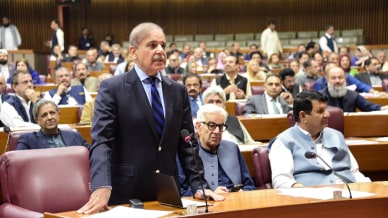Pakistan National Assembly passes constitutional amendment bill capping chief justice’s term
Pakistan National Assembly Session: The Pakistan Tehreek-e-Insaf (PTI) and the Sunni-Ittehad Council (SIC) opposed the amendment, but six independent members who held their seats with the support of the PTI supported the bill.

26th Constitution Amendment Bill: After a stretch of political maneuverings, Pakistan’s National Assembly on Monday passed the controversial 26th Constitution Amendment Bill at 5 am in the upper house of the parliament, capping the chief justice’s tenure to three years.
Also known as the Constitutional Package, the bill aims at debilitating the powers of the independent judiciary, the constitutional amendment was passed with a two-thirds majority, 255 out of 366 parliamentarians voting in the favour of the bill, reported Pakistani newspaper, The Dawn. The government required 224 votes to pass the amendment.
monthly limit of free stories.
with an Express account.
Who all voted in the favour of the bill?
The Pakistan Tehreek-e-Insaf (PTI) and the Sunni-Ittehad Council (SIC) opposed the amendment, but six independent members who held their seats with the support of the PTI supported the bill. Two Balochistan National Party (BNP-M) senators, Muhammad Qasim and Naseema Ehsan, also voted against party lines, in favour of the bill, as reported by The Dawn.
Tabled by Law Minister Senator Azam Nazeer Tarar, the amendment was passed with a total of 65 votes—23 from the Pakistan People’s Party(PPP), 19 votes from the Pakistan Muslim League(PML-N), and five from the Jamiat Ulema-e-Islam (JUI-F).
The Muttahida Qaumi Movement and Awami National Party with three votes each, the National Party and PML-Q one vote each, and four independent senators also voted for the bill.
Following its passage in both Houses of Parliament, the Constitution (26th Amendment) Act, 2024 will now be sent to the president for assent under Article 75 of Pakistan’s Constitution and become law after his signatures, PTI reported.
What does the new bill mean?
The 26th Constitutional Amendment Bill is a legislation comprising a set of constitutional amendments, including a special commission to appoint a chief justice of Pakistan out of three senior-most judges of the Supreme Court, was approved by the cabinet.
The Chief Justice, four senior-most Supreme Court judges, two senators and two national assembly members – one of each from the opposition, would be part of the new judicial commission, said Pakistan’s Law Minister.
He said the changes would help expedite the dispensation of justice by the apex court. The amendment blocked the automatic rise of the senior-most Supreme Court judge to the post of chief justice after the incumbent CJP retired, he added.
Prime Minister Shehbaz Sharif said in parliament that the 26th, is not just an amendment, “but an example of national solidarity and consensus. A new sun will rise, emanating across the nation.”
Arguments against the new amendment
The opposition, however, alleged the entire exercise of handpicking the judges was aimed at blocking Justice Mansoor Ali Shah’s appointment from becoming the chief justice on the retirement of current CJP Qazi Faez Isa on October 25, news agency PTI reported.
PTI leader Hammad Azhar termed the amendment “a death blow to the independence of the judiciary”, and explained how giving the power to appoint judges to the apex court and high courts to the government would politicise the judiciary.
The idea of the executive picking a chief justice and a parliamentary committee determining which superior court judge can hear constitutional matters are both direct attacks on judicial independence.